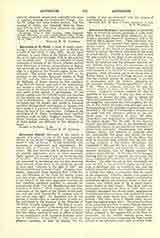

Advocatus Ecclesiae, a name applied, in the Middle Ages, to certain lay persons, generally of noble birth, whose duty it was, under given conditions, to represent a particular church or monastery, and to defend its rights against force. These advocates were specially bound to represent their clients before the secular courts. They exercised civil jurisdiction in the domain of the church or monastery, and were bound to protect the church with arms in the event of actual assault. Finally, it was their duty to lead the men-at-arms in the name of the church or monastery, and to command them in time of war. In return for these services the advocate received certain definite revenues from the possessions of the church, in the form of supplies or services, which he could demand, or in the form of a lien on the church-property. Such advocates are to be found even in Roman times; a Synod of Carthage decreed, in 401, that the emperor should be requested to provide, in conjunction with the bishops, defensores for the churches (Hefele, “Conciliengeschichte,” 2d ed., I, 83). There is evidence, moreover, for such defensores ecclesiae in Italy, at the close of the fifth century. Gregory I, however, confined the office to members of the clergy. It was the duty of these defensores to protect the poor, and to defend the rights and possessions of the church. In the Frankish kingdom, and under the Carlovingians, the duties of the church advocate were enlarged and defined according to the principles of government which prevailed in the reign of Charlemagne; henceforward we meet with the advocatus ecclesiae in the medieval sense. A Capitulary of about 790 (Mon-Germ. Hist., Cap. Reg. Francor., I, 201) ordained that the higher clergy, “for the sake of the church’s honor, and the respect due to the priesthood (pro ecclesiastico honore, et pro sacerdotum reverentia)”, should have advocates. Charlemagne, who obliged bishops, abbots, and abbesses to maintain advocati, commanded that great care should be exercised in the choice of persons to fill the office; they must be judicious men, familiar with the law, and owning property in the county (Grafschaft.—See Capitulary of 802, and 801-13, 1. c. I, 93, 172). The churches, monasteries, and canonries, as such, alike received advocates, who by degrees assumed the position above defined. In the time of Charlemagne the king had the right to appoint the advocates, but many ecclesiastical institutions obtained the right of election. The office was not, at first, hereditary, nor even for life; in the post-Carlovingian period, however, it developed into an hereditary one, and was held by powerful nobles, who constantly endeavored to enlarge their rights in connection with the church or the monastery. Conciliar decrees were passed as early as the ninth century to protect ecclesiastical institutions against the excessive claims of their advocates, who, indeed, grew to be in many ways a heavy burden to their clients. They dealt with the possessions entrusted to them as with their own property, plundered the church estate, appropriated the tithes and other revenues, and oppressed in every possible way those whom they were appointed to protect. The office, since it offered many advantages, was eagerly sought after. The excessive claims of the advocates gave rise to many disputes between them and the churches or monasteries. The bishops and abbots, who found their rights seriously curtailed, appealed to the emperor and to the Pope for protection. In the twelfth century grave warnings issued from Rome, restraining the high-handed actions of the advocates under pain of severe ecclesiastical penalties, which did not, however, put an end to all the abuses that prevailed. On certain occasions, emperors and princes exercised the office of advocate, in which case they appointed deputy-advocates (subadvocati) to represent them.
J. P. KIRSCH

